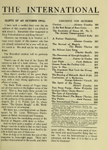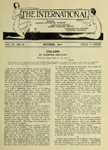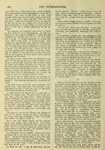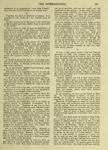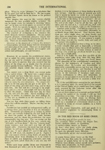100th
MP

|
THE
100th
MONKEY
PRESS |
|
|
|
Limited Editions by Aleister Crowley & Victor B. Neuburg |
|
Bibliographies |
|
Download Texts
»
Aleister
Crowley
WANTED !!NEW!!
|
|
COCAINE |
|
»» Download Text «« |
Image Thumbnails |
|||
|
Title: |
Cocaine |
|
||
|
Type of Media: |
Periodical. |
|||
|
Name: |
The International: A Review of Two Worlds. |
|||
|
Issue: |
Volume XI, Number 10. |
|||
|
Date: |
October 1917. |
|||
|
Publisher: |
International Monthly, Inc. |
|||
|
Published At: |
New York. |
|||
|
Pages: |
Pages 291-294. |
|||
|
Price: |
15 Cents. |
|||
|
Remarks: |
The original editor, George Sylvester Viereck, added the following note at the top of this piece when it appeared in their magazine: "We disagree with our gifted contributing editor on some points, but nevertheless we regard this article as one of the most important studies the deleterious effects of a drug that, according to police statistics, is beginning to be a serious menace to our youth." |
|||
|
Author’s Working Versions: |
|
|||
|
Other Known Editions: |
|
|||
|
Comments by Aleister Crowley: |
I have myself made extensive and elaborate studies of the effects of indulgence in stimulants and narcotics. (See my The Psychology of Hashish, Cocaine, The Green Goddess, The Diary of a Drug Fiend etc.) I have a vast quantity of unpublished data. I am convinced that personal idiosyncrasy counts for more in this matter than all the other factors put together. The philosophical phlegmatic temperament of the Chinese finds opium sympathetic. But the effect of opium on a vivacious, nervous, mean, cowardly Frenchman, on an Englishman with his congenital guilty conscience or on an American with his passion for pushing everything to extremes is very different; the drug is almost certain to produce disaster. — The Confessions of Aleister Crowley. New York, NY. Hill and Wang, 1969. Page 490. ______________________________
In January 1918, I published a revised version of the "Message of the Master Therion" and also of the "Law of Liberty", a pamphlet in which I uttered a panegyric upon the Law as the key to freedom and delight. (To get rid of the subject I had better mention here the other magical essays which appeared in The International: "Cocaine", "The Ouija Board", "Concerning Death", "Pax Hominibus Bonae Voluntatis", "Geomancy", "Absinthe", "De Thaumaturgia", "Ecclesiae Gnosticae Canon Missae". Of these, Liber XV, its scope and purpose, I have already described at length.) The point which I wish to bring out is that despite the constraint imposed upon me by the requirements of public taste, I succeeded in proclaiming the Law to a wide audience of selected readers, explaining its main principles and general import in straightforward language, and also in putting over a large amount of what was on the surface quite ordinary literature, but implying the Law of Thelema as the basis of right thought and conduct. In this way I managed to insinuate my message perhaps more effectively than could possibly have been done by any amount of visible argument and persuasion. The Scrutinies of Simon Iff are perfectly good detective stories, yet they not only show a master of the Law as competent to solve the subtlest problems by considerations based upon the Law, but the way in which crime and unhappiness of all sorts may be traced to a breach of the Law. I show that failure to comply with it involves an internal conflict. (Note that the fundamental principle of psychoanalysis is that neurosis is caused by failure to harmonize the elements of character.) The essence of the Law is the establishment of right relations between any two things which come into contact: the essence of such relations being "love under will". The only way to keep out of trouble is to understand and therefore to love every impression of which one becomes conscious. — The Confessions of Aleister Crowley. New York, NY. Hill and Wang, 1969. Page 828. |
|||
|
Reviews: |
|
|||

